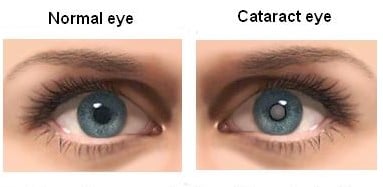Does Medicare cover cataract surgery? Almost everyone I speak with wants to know! Short answer: if cataract surgery is medically necessary, it can be covered under Medicare Part B. Cataract surgery is one of the more common procedures performed on Medicare recipients. In fact, one Harvard article suggests that almost half of us will have cataracts by the time we are 80 years old. The truth is that Medicare does cover much of the cost of cataract surgery, but it does not cover everything! We have all the details for you about cataract surgery and Medicare programs.
Does Medicare Cover Vision Care?
Generally, Medicare does not cover vision care (routine checkups, glasses, contact lenses, etc.). However, Medicare does cover medically necessary services. What does that mean? Cataract surgery that is deemed by a physician as medically needed, falls into this category. With Original Medicare, surgery services for cataracts are typically covered under your Part B portion of Medicare.
Different parts of Medicare cover different areas of medical expenses. If you need a refresher on the parts of Medicare, be sure to check out our video that explains it all.
As a reminder, Medicare Part B insurance covers outpatient services. If you have a Medicare Advantage plan, they should cover the same services as Original Medicare but may have different costs and conditions. We know, it’s confusing! Therefore, if you are on a Medicare Advantage plan, it is very important to contact your plan representative for your specific costs and how much Medicare Advantage will pay for your cataract surgery. They will know exactly what is covered and what isn’t.
What are Cataracts?
If you are reading this, you are likely familiar with cataracts. However, for those of you who may need a brush up, let’s do a quick review. Inside our eyes is a natural lens. The lens bends (refracts) light rays that enter the eye to help us see. The lens should be clear. For those with a cataract, the lens has become cloudy as though you are looking through a foggy or dusty car windshield. Things look blurry, hazy, or less colorful with a cataract.

What causes cataracts? Well, aging is the most common cause for developing a cataract. Around age 40, normal proteins in the lens start to break down. This can cause the lens to get cloudy. Usually, people over age 60 start to have some clouding of their lenses. However, vision problems may not occur until years later.
The only way you can remove a cataract is with surgery. During cataract surgery, the cloudy natural lens is removed and replaced with a clear artificial lens called an intraocular lens (IOL). While this may sound invasive, usually cataract surgery is relatively low risk and highly effective. However, as with most medical procedures, there are risks and complications. Cataracts are not usually a life-threatening or emergency situation, and your physician can help you determine when/if you need surgery to help improve your vision. Most often cataract surgery is not deemed medically necessary unless the cataracts are interfering with your vision in a noticeable manner. Usually, if both eyes need correction, the surgeries will be completed with 4-8 weeks in between.
How Much does Medicare Cover for Cataract Surgery?
Medicare specifically covers these parts of cataract surgery services:
- Removal of the cataract
- Basic lens implants
- One set of prescription eyeglasses or one set of contact lenses after the surgery
Medicare covers basic lens implants only. Medicare does not cover more advanced implants.
Important to note: If your provider recommends more advanced lens implants, you may have to pay some or all of the cost. Talk with your health care provider before surgery to understand which costs you will be responsible for, and which costs will be paid by Original Medicare or your Medicare Advantage plan.
Whether you have Original Medicare (Part A and Part B) or Medicare Advantage, here is a breakdown of Medicare billing and coverage for the costs associated with cataract surgery:
- Medicare Part B would cover your outpatient surgery center costs. This includes doctor’s fees and other expenses associated with outpatient surgery.
- Once you meet your Medicare Part B deductible, Medicare pays 80% of allowable charges.
- Medicare Part A would cover your hospital stay if the cataract surgery takes place in a hospital rather than an outpatient facility. The Medicare Part A deductible would need to be paid if your cataract surgery requires an inpatient stay.
- Medicare Part D would cover any drops and other medications you are prescribed before and after the cataract surgery.
What does Medicare Cover after Cataract Surgery?
After the surgery, Medicare will cover one pair of glasses or contact lenses. This is an exception to Medicare coverage rules, which normally exclude eyeglasses from coverage.
Important to note: If on Original Medicare, you should obtain your glasses or contact lenses from a supplier that accepts assignment to pay the least for your item. You will pay 20% of the Medicare approved amount for the glasses or contact lenses. If on a Medicare Advantage plan, contact you plan representative to learn where you should get your glasses or contact lenses.
Medicare Vision Reimbursement for Glasses or Contacts After Cataract Surgery:
Bonus note: Some people have had trouble attaining coverage for their glasses or contact lenses post cataract surgery from Original Medicare or their Medicare Advantage plan. If you are denied coverage for your glasses or contact lenses, you can appeal the decision. Request the glasses or contact lenses be covered, or request a reimbursement if already purchased. Both you and your health care provider can write appeal letters to the plan. Be sure to state in your letter, that you meet the Medicare requirements for cataract surgery, therefore, your prescription glasses or contact lenses must be covered.
To summarize, generally cataract surgery IS covered under Medicare Part B, if it is deemed a medically necessary procedure by your physician. If you’re confused by cataract surgery or any other elements of Medicare, be sure to contact Medicare Dana. We are an independent insurance agent which means we have the power to shop the market and find the best rates and the right Medicare program for you.
Contact Medicare Dana. 512-666-7785, fill out a contact form, or leave a comment below. Looking forward to hear from you!

